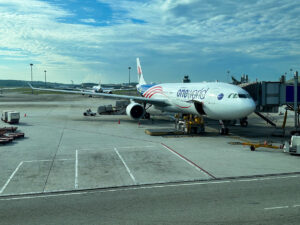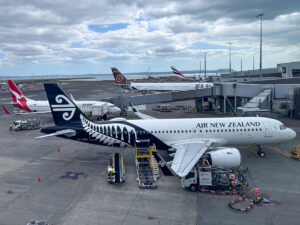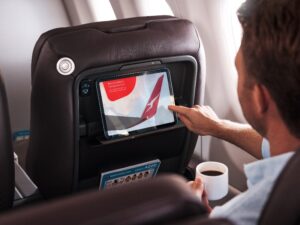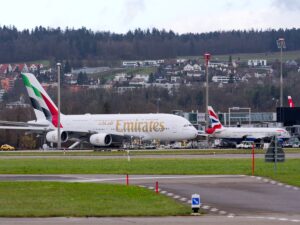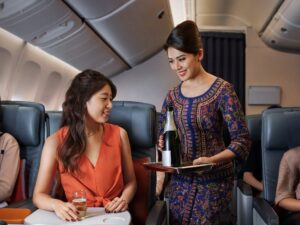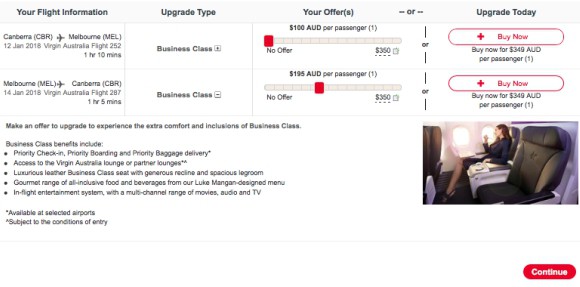
Since launching in 2009, Plusgrade has made quite an impact on the airline industry. Plusgrade now facilitates online Business Class upgrade auctions for around 70 airlines including Qantas, Virgin Australia, Air New Zealand and Etihad Airways. And the company continues to grow.
If you’ve ever received an invitation to bid for an upgrade on your upcoming flight, this would almost certainly be via Plusgrade. So, even if you’ve never heard of Plusgrade, you’ve probably come across it at some point.
Bidding via the Plusgrade platform is one way to enjoy extra comfort and luxury when flying, at a reasonable price.
How Plusgrade’s business model works
In a nutshell, Plusgrade helps airlines to maximise ancillary revenue by auctioning off empty seats that passengers are prepared to pay more for. Plusgrade offers airlines a system to do this, although airlines retain control over the pricing and allocation of upgrades.
Each time a passenger is upgraded through a Plusgrade bid, the airline pays a small commission to Plusgrade. So, it’s in the company’s interests to upgrade as many passengers as possible. It’s also in the airline’s interests to do so as each upgrade represents extra high-margin revenue. And, of course, customers also like to receive an upgrade for a reasonable price. (When upgrading via Plusgrade, you’ll typically pay far less than the normal price difference between Economy and Business Class.) So, it really is a win-win for everyone involved.
Read more: Bid for an Upgrade on your Next Flight
As well as “premium upgrades”, Plusgrade offers a “neighbour-free” product to airlines. With this, Etihad and various low-cost airlines use Plusgrade to auction off guaranteed neighbour-free seats (aka. shadows) to passengers.
How Plusgrade upgrades are allocated
Every passenger that bids for an upgrade via Plusgrade will offer a certain amount of money and/or frequent flyer points for the seat.
If there are not enough upgrades available for all of the passengers that have placed a bid, the airline will need to decide on who gets upgraded. The upgrades will be allocated in order from the highest to lowest bid amounts.
However, it’s not quite this simple. Airlines can choose to up-weight or down-weight a customer’s bid for a variety of reasons. For example, passengers with frequent flyer status may have their bid effectively “increased” by the airline, to give the customer a higher chance of success. But airlines may also lower a customer’s chances of success if they’ve recently had one or more successful upgrade bids. After all, airlines would prefer that customers actually buy Business Class tickets if Business Class is where they want to sit. trippin_the_rift explains this in an AFF thread discussing Malaysia Airlines upgrades.
As an example, let’s say the minimum bid amount for a Sydney-Auckland upgrade is $200. Customer A bids $200, Customer B bids $250 and Customer C bids $300. But Customer A has Platinum status with the airline, while Customer B has no status and was upgraded on their previous flight. If there are only two empty seats in Business Class, it is possible that the seats could be given to Customer A and Customer C. Even though Customer B bid a higher amount than Customer A, the airline allocated a higher internal weighting the latter bid.
Air New Zealand, for example, has an official policy of increasing the weighting of OneUp bids placed by frequent flyers with Airpoints status.
Qantas offers BidNow upgrades, where flyers need to bid a mix of points and cash. In this case, we believe that the points are converted to an equivalent cash value internally for the purpose of comparing bids. The points are not valued that highly – we expect they’re probably valued at around 0.7 cents per Qantas point, which is about the same as a Qantas points is valued when making a Points+Pay booking. So, you’re better off bidding only the minimum number of points and paying the remainder in cash.

